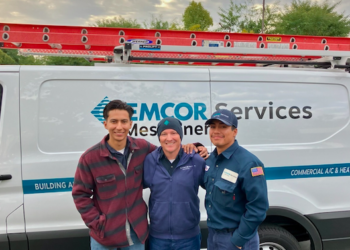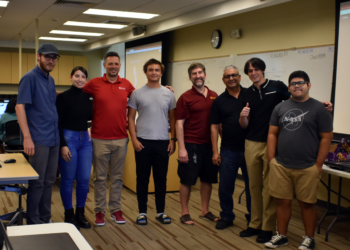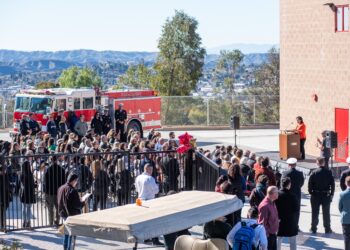Colleges and Community – From Health Services to Help Desks
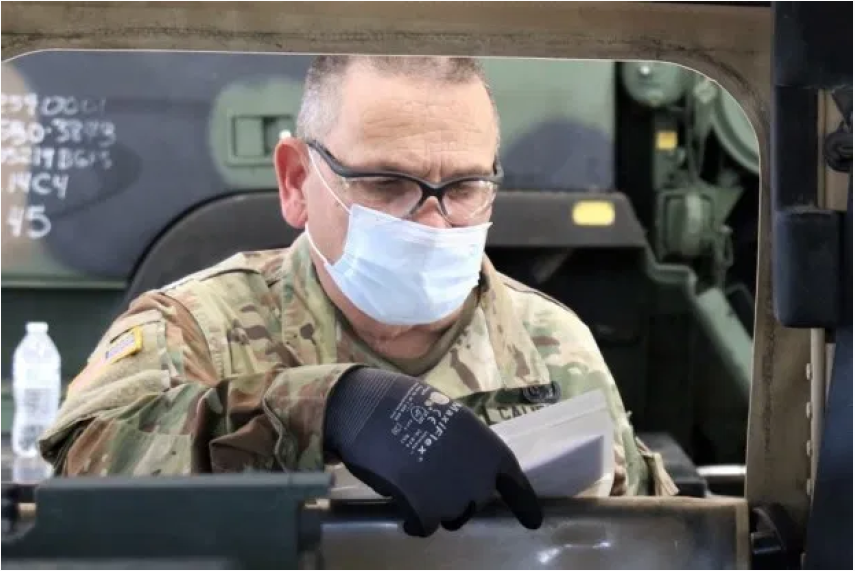
Crafton Hills College
76 students graduated from the Crafton Hills Medical Technician Program amidst a pandemic.
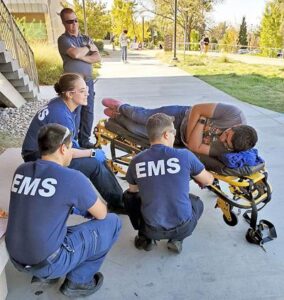
During the first portion of the stay-at-home order, lectures were conducted online.
“The transition was taxing for both students and faculty since this program is heavily based in personal contact and teamwork,” said Laurie Green, EMT program director.
Later, the students were able to meet on campus with social distancing guidelines in place to complete skills practice and testing.
“This had its own challenges,” Green said, “since the students had formed a bond and we now required them to space out every 6 feet.”
After spring break, students were not allowed to perform ride outs with community partners. This greatly limited the options students had to gain traditional hands-on experience. 10 students were able to get field contacts and the rest were able to conduct patient contact in the simulation lab.
“This worked out because of the awesome equipment we have been provided in the lab, though nothing replaces the learning experience of a live patient,” Green said.
Accredited by the Commission on Accreditation of Allied Health Education Programs, students who complete this certificate program are prepared to take the National Registry examination and obtain entry-level employment as an Emergency Medical Technician or an Emergency Department Technician.
Moreno Valley College
Chris Cummins won’t graduate from the paramedic program at Moreno Valley College until October. But the 29-year-old is raring to get on the front lines and help health-care providers who are battling the coronavirus pandemic in Southern California.
Cummins is among thousands of students nationwide at universities and community colleges in schools of medicine, nursing, and emergency services who could potentially lend a helping hand to doctors, nurses and hospital staff who are overwhelmed by the deluge of COVID-19 cases heading their way.
Cummins, who is training to be a paramedic at Moreno Valley College, said the coronavirus pandemic has solidified his resolve to complete his training and serve his community.
“I’m just very clear in my mind that I want to be out there helping people,” Cummins said. “I view this as a challenge to better myself and help our brothers and sisters in the medical field who are being overworked and stressed. If we complete our training and graduate in time and get into the workforce, we’ll be able to contribute to the care of the people in the community during a very difficult time.”
“This could be a win-win where we could help them and they can help us,” Baker said. “With the COVID-19 crisis, the health care industry needs professionals across the skill spectrum — from taking vital signs and helping people go to the bathroom to higher levels of care.”
Mt. San Jacinto College
Mt. San Jacinto College has teamed up with OnTrac to deliver 3D-printed face shields to regional hospitals to support front-line workers during the COVID-19 pandemic.
OnTrac, a parcel delivery service, has provided its services for free to benefit the hospitals and health care professionals during the health crisis.
“The proportions of this challenge are daunting, but keeping doctors, nurses, and all other professionals as safe as possible is the goal. I’m glad we can do our part,” Hal Edghill, who operates MSJC’s Eagle MakerSpace, said.
MSJC is using 3D printers in the Eagle MakerSpace on its Menifee Valley Campus to manufacture the face shields, which serve as extra protection covering the masks that health care workers wear in the hospitals.
“We were honored to be able to help our medical partners who indicated they had a need for these types of items,” Joyce Johnson, MSJC’s executive dean of instruction and a registered nurse, said. “The school closures mean our students cannot use this equipment at this time. We wanted to make sure we did our part to help protect medical professionals and patients alike during this pandemic.”
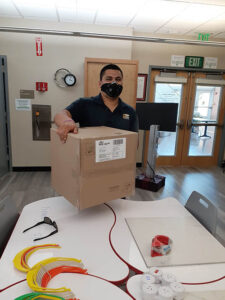
To make the face shields, the MakerSpace uses polylactic acid plastic in MakerBot 3D printers to build the visor component, Edghill said. The face shield is made from commercially available transparency sheets that instructors have more commonly used with overhead projectors. The connector at the back of the visor is a No. 33 rubber band.
For less than a dollar, residents can save a life. To help contribute to MSJC’s efforts during the coronavirus crisis, whether monetarily or through supply donations, visit http://www.msjc.edu/foundation.
Riverside City College
We are proud to announce that RCC’s School of Nursing’s simulation laboratory received accreditation by the Society for Simulation in Healthcare (SSH) Accreditation Committee, becoming the first community college facility in California to earn this accreditation!
“Obtaining SSH accreditation was a long-held dream of the RCC School of Nursing, as it designates the excellence and quality of the simulation program, we have developed over the last 10 years,” Dean of Nursing, Sandy Baker said.
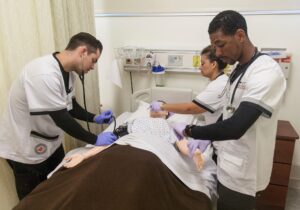
For more information on our School of Nursing, visit:
https://www.rcc.edu/…/schoolof…/Pages/School-Of-Nursing.aspx
Nursing students also will be allowed to complete their clinical hours so they can graduate on time and join the workforce in June, said Sandy Baker, dean of the Riverside City College’s School of Nursing. Students also might have the option to sign up for Newsom’s Health Corps so they can be deployed anywhere in the state and get credit for clinical hours, she said, adding that her fourth-year nursing students require 108 hours of direct patient care experience.
San Bernardino Community College District: Crafton Hills College and San Bernardino Valley College
Besides helping students navigate conditions under COVID-19, the San Bernardino Community College District is assisting many who await a U.S. Supreme Court ruling this month about the fate of DACA. The federal policy, Deferred Action for Childhood Arrivals (DACA), gives eligible young undocumented immigrants protection from deportation and allows them to work legally in the country.
Using a grant from the Mexican Consulate in San Bernardino, the San Bernardino Community College District created an Educational Opportunities Help Desk inside the consulate near 3rd and D streets.
Mariana Lopez, an SBCCD representative, picks up the phone at the help desk, guiding families in applying for college, learning English, or finding a way to transfer training from Mexico to California. Over the past three years, the college district has built a coalition of partners from California State University, San Bernardino, UC Riverside, and local K-12 districts in Riverside and San Bernardino counties to ensure families have all the information they need.
They even offer access to free legal services for undocumented students.
“Our goal is to boost our local economy by increasing the educational levels of all students and families in our region,” says Dr. Anne L. Viricel, chair of the SBCCD Board of Trustees.
Lopez, the program coordinator, helps people apply for financial aid, scholarships, and career training programs at community colleges. She has advised 500 people one-on-one and presented to large groups totaling around 10,000 people since she started.
She promotes the advantages of all of California’s highly respected college branches, from the community colleges to the Cal States and the UC campuses. Before the pandemic, she had hundreds of potential clients in the crowds of people inside the consulate. But the pandemic means she now works at home, presenting on Facebook Live. She uses Zoom to help families still searching for answers. How do they find faster internet so their children can keep up with school? How do they find the right training program that will lead to a good job? She offers advice to anyone who calls. Callers do not have to be from Mexico or even immigrants.
Luz Gallegos, who works with TODEC Legal Center (Training Occupational Development Educating Communities) in Perris, helps Lopez convince families that it will be okay for their young person to apply for state scholarship money.
“Sometimes, parents are afraid of letting their kids go to college because they are afraid that getting financial aid will impact their ability to get their green cards.” She explains to them that California programs don’t count against the federal mandate about immigrants not becoming a “public charge.” She says higher education is the path to increasing the success of immigrants, and the success of the whole community.
“We know that when the kid goes off to college, we know it is a win for the family, for our state and our country.”
SBCCD Trustee Viricel says that “No matter what the U.S. Supreme Court decides, the Educational Opportunities Help Desk will continue supporting all students.”
Victor Valley College
California State Guard Staff Sgt. David Steinback of Hesperia, a noncommissioned officer in charge of maintenance with the state guard’s 224th Support Detachment, is serving at the Combined Support Maintenance Shop in Long Beach.

He is one of the members of the California State Guard who are filling in at the Combined Support Maintenance Shop for California Army National Guard soldiers who are supporting COVID-19 response missions, according to a news release.
Steinback is an automotive instructor at Victor Valley College in Victorville
